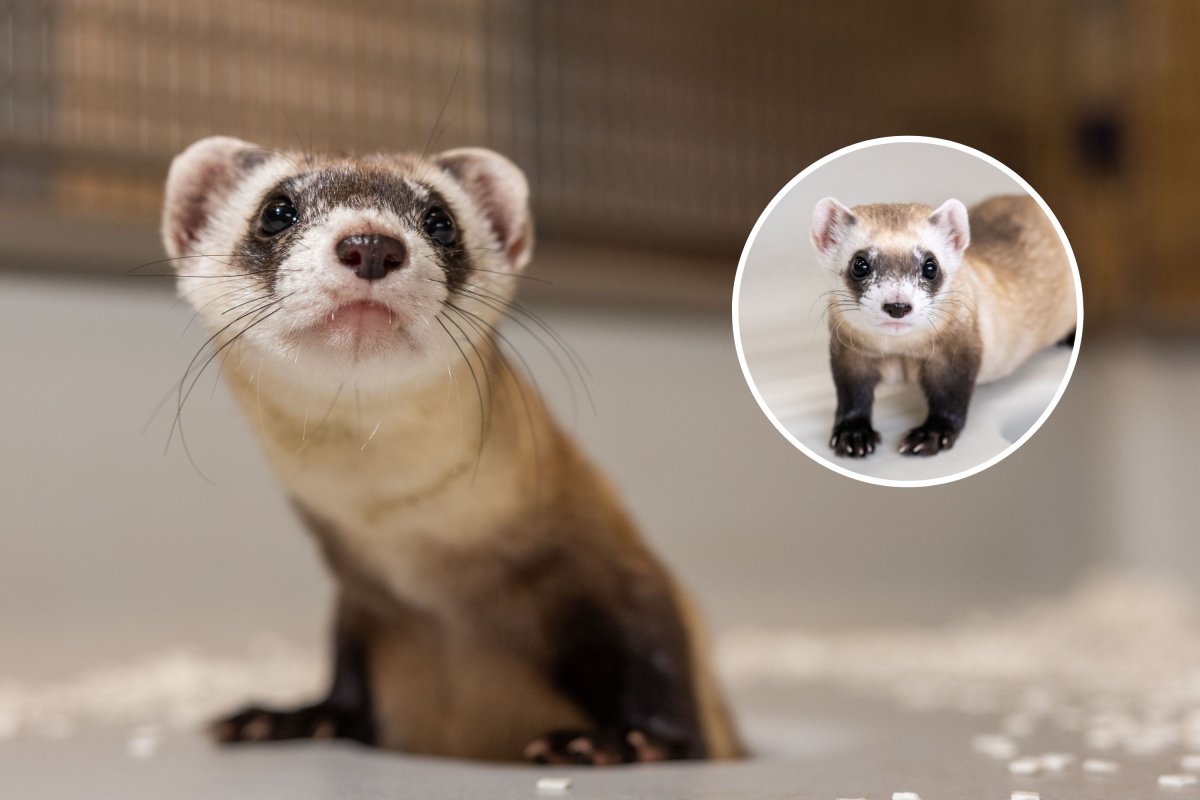Two endangered baby black-footed ferrets have been born, but these babies are extremely unusual—they're both clones.
Noreen was born at the National Black-Footed Ferret Conservation Center in Colorado, while the other clone, Antonia, was born at the Smithsonian's National Zoo & Conservation Biology Institute in Virginia, the U.S. Fish and Wildlife Service announced.
These two baby ferrets are genetically identical, and also identical to another of the endangered species named Elizabeth Ann, as all three were cloned from the same genetic material.
Black-footed ferrets, also known as American polecats or prairie dog hunters, are among the most endangered mammals in the United States. Throughout the 20th century, the species experienced a huge decline, mainly due to reductions in prairie dog numbers and the spread of the sylvatic plague.

The species was declared extinct in 1979, but only a few years later in 1981, one remaining population was found in Meeteetse, Wyoming.
Elizabeth Ann, Noreen, and Antonia are all clones of a ferret named Willa, a female captured just after the species was rediscovered. Her tissue samples were collected in 1988 and stored in the San Diego Zoo Wildlife Alliance's Frozen Zoo.
All of the black-footed ferrets alive today are descended from the same seven wild individuals, with the exception of the three clones. These remaining ferrets, therefore, have very little genetic diversity, which poses an issue for breeding the ferrets, as their offspring may be left at risk of genetic bottlenecking.
When a population undergoes a bottleneck, dramatically reducing in numbers, the genetic diversity of the entire group is narrowed down to the genes of the survivors, meaning that many different versions of a gene that were once present in the original population may be lost forever. The smaller the number of individuals that survive the bottleneck, the more genetic diversity is likely to be lost.
This can make the population more vulnerable to environmental changes and diseases since there's less genetic variability to adapt to new threats or changes. Additionally, with fewer individuals to mate with, inbreeding becomes more likely, which can lead to an increase in the frequency of damaging genes manifesting as health issues.
Willa never reproduced, however, meaning that the three clones represent a source of genetic diversity for the remaining population.
Therefore, these clones are hoped to help the captive breeding and reintroduction efforts for this species. They have been reintroduced into the wild across 34 separate sites, and the FWS thinks that several hundred ferrets are currently successfully surviving outside of captivity.
"These samples contain three times more unique genetic variations than found on average in the current population. Introducing these currently unrepresented genes into the existing population would significantly benefit the species' genetic diversity," the FWS said in a statement.
While Elizabeth Ann was the first clone of this species, she was unable to breed due to a condition with her uterus. It is hoped that her fellow clones, Noreen and Antonia, will be able to successfully breed once they're sexually mature, helping build up the genetic diversity of the remaining population. Both young ferrets are healthy and developing as expected. According to the FWS, none of the cloned individuals will be released into the wild.
"The introduction of novel, currently unrepresented genetic material may provide a significant boost to the genetics of the current black-footed ferret population," the FWS said in a Q&A about the new clones. "Successful genetic cloning does not diminish the importance of addressing habitat-based threats to the species or the Service's focus on addressing habitat conservation and management to recover black-footed ferrets."
Do you have a tip on a science story that Newsweek should be covering? Do you have a question about cloning? Let us know via science@newsweek.com.
Uncommon Knowledge
Newsweek is committed to challenging conventional wisdom and finding connections in the search for common ground.
Newsweek is committed to challenging conventional wisdom and finding connections in the search for common ground.
About the writer
Jess Thomson is a Newsweek Science Reporter based in London UK. Her focus is reporting on science, technology and healthcare. ... Read more
To read how Newsweek uses AI as a newsroom tool, Click here.








